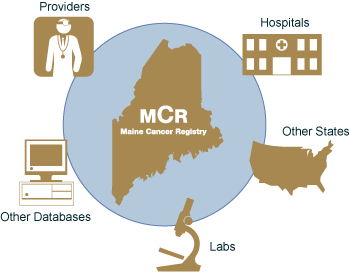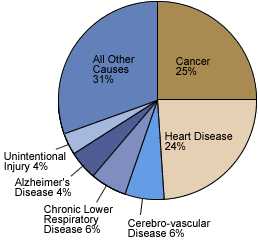DHHS → MeCDC → Population Health → Data Research → About MCR → Data Collection
Maine Cancer Registry - About Data Collection

Where do cancer case reports come from?
All hospitals, health care facilities, physicians, and other providers who diagnose or treat cancer patients are required by law to report new cases to the MCR within 6 months of seeing the patient. The MCR also actively finds new cancer cases in other databases at independent labs, state death files and other state registries to help insure the completeness of reporting.
What does the MCR do with reported cases?
The MCR spends a lot of time making sure that the information is complete and accurate. For example, because more than one source often reports the same case, MCR staff must make sure that each case is in the database only once. MCR staff are specifically trained to do this quality assurance work and keep these skills up to date with continuous education.
What kind of information is reported?
- About the person: age, sex, race, residence, occupation
- About the cancer: which body part (site), how far it has spread (stage), when it was diagnosed
- Treatment: surgery, radiation, chemotherapy
How is the information kept confidential?
The MCR follows strict requirements of federal and state law to keep all personal information confidential. This means that any information that could identify a person is kept in locked files or secure computer accounts. Strict policies are in place regarding the release of data.
How are MCR cancer data used?
MCR data are currently used in several forms, including:
- the annual report, which is often used to answer general questions by the public;
- special reports which are generated in response to requests for aggregated data;
- identifiable data sets for researchers in the field of cancer;
- investigating local concerns about cancer rates; and
- data submissions for larger collaborative efforts.
| Data Use | Types of Users |
|---|---|
| Annual Report | Public Health Organizations (private/public), Other State Agencies, Legislators, Hospitals, Universities, Health Insurance Companies, Private Citizens |
| Summary data reports | Comprehensive Cancer Planning Initiatives, Hospitals, Universities, Students, State Agencies |
| Identifiable data for research | Researchers & Planners |
| Local concerns about rates | State Agencies, Towns, Industries |
| Data submissions | North American Association of Central Cancer Registries, National Program of Cancer Registries, Central Brain Tumor Registry of the United States |
Why is Collecting Data Important?
 Cancer has recently become the leading cause of death among Maine citizens. Each year over 8,000 Maine residents are diagnosed with cancer and over 3,100 die of this disease. Many of these deaths could be prevented through early detection or behavioral changes. The data from the MCR can be used to learn:
Cancer has recently become the leading cause of death among Maine citizens. Each year over 8,000 Maine residents are diagnosed with cancer and over 3,100 die of this disease. Many of these deaths could be prevented through early detection or behavioral changes. The data from the MCR can be used to learn:
- More about the causes of cancer and how to prevent it.
- How to detect cancer earlier so there is a better chance of cure.
- Whether concerns about local rates of cancer, which may be too high, need further investigation.
The Maine Cancer Registry seeks to reduce the incidence and mortality due to cancer by providing data for research and intervention programs.

